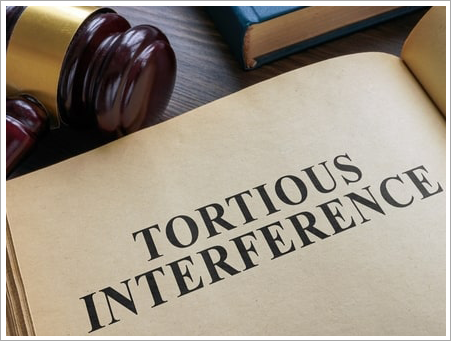When Can Commercial Litigation Address Tortious Interference?
It is important for business owners to understand the legal issues that they may need to address when entering into contracts or enforcing the terms of contractual agreements. In some cases, a business may need to address tortious interference. When another party attempts to interfere with a company’s contractual agreements or commercial relationships, these issues may be addressed through commercial litigation. By understanding the principle of tortious interference, business owners can determine the actions they can take to protect themselves from potentially damaging situations.

What Is Tortious Interference?
Tortious interference occurs when someone intentionally interferes with an existing contract or a relationship between two parties. This type of interference may stem from false statements made about the other party; the use of threats, coercion, or intimidation; or even using bribery in an effort to manipulate a party into breaching their contract. A party who commits tortious interference could attempt to induce a breach of contract, seek to have someone commit a breach of their fiduciary duty, or obstruct the formation of a contract or relationship. In many cases, tortious interference will lead to significant financial losses for the affected parties. To successfully pursue litigation against someone for tortious interference, a business owner must prove that there was malicious intent on the part of the interfering party.
When Can Commercial Litigation Address Tortious Interference?
Commercial litigation may be used to resolve disputes between businesses related to contracts and other agreements, as well as actions by a party that have caused a business to suffer financial losses. Generally speaking, if one party believes they have suffered damages due to tortious interference by another party, they may be able to pursue compensation for those damages through commercial litigation. Depending on the particulars of a case, damages may include lost revenues or profits, attorney’s fees, and other costs associated with addressing this kind of wrongdoing. In addition, if successful in court, the plaintiff may also be awarded injunctive relief, which will prevent the other party from engaging in activity that could be considered tortious interference. Punitive damages may also be awarded in cases where a person wilfully violated the law or maliciously attempted to cause harm to a business.
There are certain criteria that must be met in order for a case to be valid under commercial law. Most of the time, the parties involved must have had a valid business relationship prior to the incident in question; any attempts at interference must have been intentional on behalf of the accused; and any damages suffered as a result of the alleged acts must have been real and substantial. It is advisable for businesses to seek out experienced legal counsel before proceeding with any type of commercial litigation. A skilled attorney can help ensure that all relevant facts are presented accurately and that these issues will be properly evaluated by the court system.
Contact Our Cook County Commercial Litigation Attorneys
Commercial litigation is an invaluable tool for business owners who have suffered losses due to the malicious intent of other parties. In order to successfully pursue litigation related to tortious interference and receive adequate compensation for your losses, it is crucial to enlist professional legal help. At Teller, Levit & Silvertrust, P.C., our Chicago commercial litigation lawyers can provide legal representation to help you address tortious interference, and we will vigorously pursue all legal remedies available. If you have questions about commercial litigation, tortious interference, or other related concerns, please call our office at 312-922-3030 to set up a consultation.
Sources:
https://www.law.cornell.edu/wex/tortious_interference
https://uk.practicallaw.thomsonreuters.com/5-382-9829?transitionType=Default&contextData=%28sc.Default%29
Putting Your
Business First
Business First
To learn more about our services or schedule an appointment,
please call 312-922-3030 or fill out the form below:
To learn more about our services or schedule an appointment, please call 312-922-3030 or fill out the form below:


